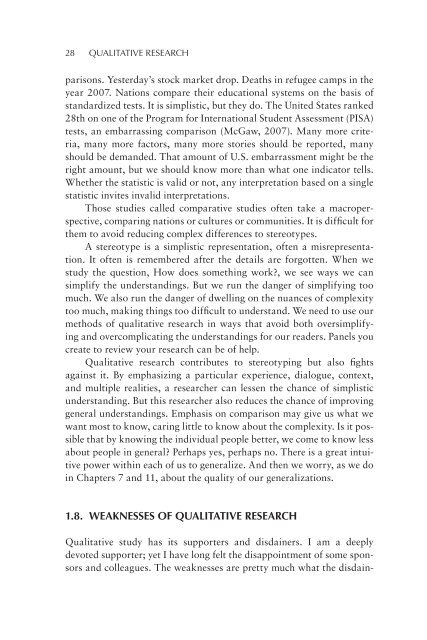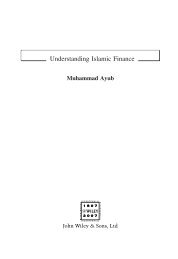How Things Work - Doha Academy of Tertiary Studies
How Things Work - Doha Academy of Tertiary Studies
How Things Work - Doha Academy of Tertiary Studies
You also want an ePaper? Increase the reach of your titles
YUMPU automatically turns print PDFs into web optimized ePapers that Google loves.
28 QUaLItatIVe ReSeaRCH<br />
parisons. Yesterday’s stock market drop. Deaths in refugee camps in the<br />
year 2007. Nations compare their educational systems on the basis <strong>of</strong><br />
standardized tests. It is simplistic, but they do. The United States ranked<br />
28th on one <strong>of</strong> the Program for International Student Assessment (PISA)<br />
tests, an embarrassing comparison (McGaw, 2007). Many more criteria,<br />
many more factors, many more stories should be reported, many<br />
should be demanded. That amount <strong>of</strong> U.S. embarrassment might be the<br />
right amount, but we should know more than what one indicator tells.<br />
Whether the statistic is valid or not, any interpretation based on a single<br />
statistic invites invalid interpretations.<br />
Those studies called comparative studies <strong>of</strong>ten take a macroperspective,<br />
comparing nations or cultures or communities. It is difficult for<br />
them to avoid reducing complex differences to stereotypes.<br />
A stereotype is a simplistic representation, <strong>of</strong>ten a misrepresentation.<br />
It <strong>of</strong>ten is remembered after the details are forgotten. When we<br />
study the question, <strong>How</strong> does something work?, we see ways we can<br />
simplify the understandings. But we run the danger <strong>of</strong> simplifying too<br />
much. We also run the danger <strong>of</strong> dwelling on the nuances <strong>of</strong> complexity<br />
too much, making things too difficult to understand. We need to use our<br />
methods <strong>of</strong> qualitative research in ways that avoid both oversimplifying<br />
and overcomplicating the understandings for our readers. Panels you<br />
create to review your research can be <strong>of</strong> help.<br />
Qualitative research contributes to stereotyping but also fights<br />
against it. By emphasizing a particular experience, dialogue, context,<br />
and multiple realities, a researcher can lessen the chance <strong>of</strong> simplistic<br />
understanding. But this researcher also reduces the chance <strong>of</strong> improving<br />
general understandings. Emphasis on comparison may give us what we<br />
want most to know, caring little to know about the complexity. Is it possible<br />
that by knowing the individual people better, we come to know less<br />
about people in general? Perhaps yes, perhaps no. There is a great intuitive<br />
power within each <strong>of</strong> us to generalize. And then we worry, as we do<br />
in Chapters 7 and 11, about the quality <strong>of</strong> our generalizations.<br />
1.8. WeaKNesses OF Qualitative ReseaRch<br />
Qualitative study has its supporters and disdainers. I am a deeply<br />
devoted supporter; yet I have long felt the disappointment <strong>of</strong> some sponsors<br />
and colleagues. The weaknesses are pretty much what the disdain-

















